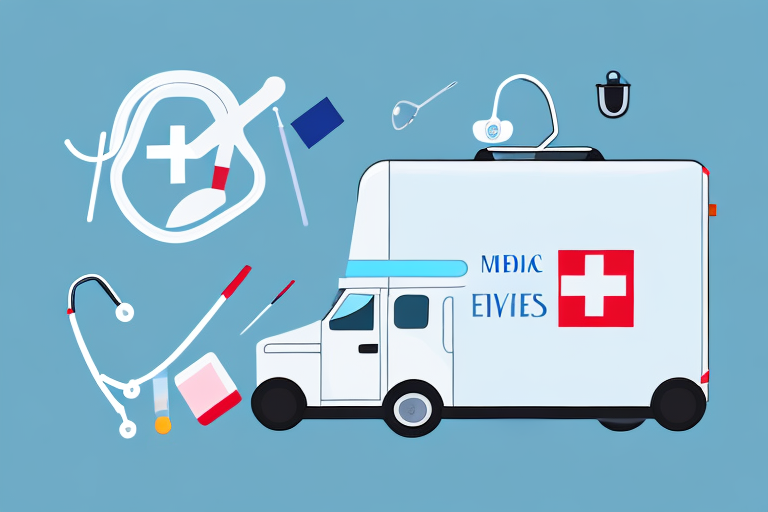Understanding the Medical Courier Industry
The medical courier industry plays a critical role in the healthcare sector by ensuring the safe and timely transportation of medical supplies, equipment, and specimens between healthcare facilities, laboratories, and patients. According to the IBISWorld report on Medical Courier Services, the industry has been experiencing steady growth due to the increasing demand for reliable delivery solutions in healthcare. Medical couriers must maintain a high level of reliability, security, and professionalism, as delays or mishandling can have significant impacts on patient health.
Conducting Market Research and Business Planning
Researching Your Target Market
Before launching your medical courier business, it's essential to thoroughly research your target market. Identify local healthcare facilities such as hospitals, laboratories, clinics, and nursing homes that require courier services. Understanding their specific needs allows you to tailor your services effectively. For instance, some facilities may require 24/7 courier services, while others might need temperature-controlled transportation for sensitive specimens.
Creating a Comprehensive Business Plan
A solid business plan is the foundation of any successful venture. Your plan should outline your business goals, target market, competitive analysis, financial projections, and marketing strategies. According to the U.S. Small Business Administration, a well-crafted business plan not only guides your operations but also is crucial when seeking financing from lenders or investors.
Navigating Legal and Financial Requirements
Obtaining Necessary Licenses and Permits
Compliance with federal, state, and local regulations is paramount in the medical courier industry. This typically includes acquiring a commercial driver's license (CDL), securing appropriate insurance coverage, and obtaining any specialized permits required for transporting medical materials. The Federal Motor Carrier Safety Administration provides detailed guidelines on the necessary licenses and permits for transportation businesses.
Securing Financing for Your Business
Starting a medical courier business involves significant upfront costs, including purchasing vehicles, equipment, and securing necessary licenses. Potential funding sources include traditional bank loans, Small Business Administration (SBA) loans, and private investors. Additionally, exploring grants specifically for healthcare-related businesses can provide non-repayable funds to support your startup.
Setting Up Operations and Logistics
Purchasing Vehicles and Equipment
Investing in reliable vehicles is crucial for timely deliveries. Depending on your service offerings, you may need vans, refrigerated trucks, or specialized equipment for handling sensitive materials. Regular maintenance schedules should be established to ensure vehicle safety and longevity, as recommended by the Insurance Information Institute.
Implementing Technology Solutions
Leveraging technology can significantly enhance the efficiency of your operations. Implementing GPS tracking systems allows for real-time monitoring of deliveries, ensuring timely and accurate service. Additionally, using transportation management software can streamline route planning, inventory management, and customer communications.
Building Strong Relationships with Healthcare Providers
Developing Partnerships
Establishing strong partnerships with healthcare providers is essential for sustained business growth. Reach out to hospitals, clinics, and laboratories to offer your services, emphasizing reliability and compliance with industry standards. According to a study by the Journal of Healthcare Management, strong relationships with healthcare providers can lead to long-term contracts and repeat business.
Maintaining High Standards of Customer Service
Exceptional customer service differentiates your business in a competitive market. Implementing feedback mechanisms, such as surveys and follow-up calls, helps address client concerns promptly and improve service quality. Consistently meeting or exceeding client expectations fosters loyalty and positive word-of-mouth referrals.
Ensuring Compliance and Managing Risks
Adhering to HIPAA Regulations
Handling medical specimens and sensitive information requires strict compliance with the Health Insurance Portability and Accountability Act (HIPAA). Training employees on HIPAA regulations and implementing secure data handling procedures are critical steps to protect patient privacy and avoid legal repercussions. The U.S. Department of Health & Human Services provides comprehensive guidelines on HIPAA compliance.
Managing Insurance and Liability
Protecting your business against potential risks involves securing appropriate insurance coverage. This typically includes commercial auto insurance, general liability insurance, and professional liability insurance. Consulting with an insurance professional can help determine the specific coverage needs for your business.
Marketing Your Medical Courier Business
Developing an Effective Marketing Strategy
A robust marketing strategy is essential for attracting and retaining clients. Utilize a mix of online and offline marketing channels, such as developing a professional website, engaging in social media marketing, and networking at healthcare industry events. According to Forbes, a diversified marketing approach increases brand visibility and client acquisition.
Leveraging Digital Marketing
Building a strong online presence through search engine optimization (SEO), content marketing, and online advertising can drive traffic to your website and generate leads. Creating informative blog posts, such as guides on the importance of reliable medical courier services, positions your business as an industry authority.
Scaling and Expanding Your Business
Evaluating Performance and Adjusting Strategies
Regularly assessing key performance indicators (KPIs) such as delivery times, customer satisfaction, and financial metrics helps identify areas for improvement. Utilizing tools like Tableau for data visualization can aid in making informed business decisions.
Expanding into New Markets
Once established, consider expanding your services to new geographic areas or offering additional specialized services, such as transporting medical waste or providing emergency courier services. Conducting market research and feasibility studies ensures that expansions are strategically planned and financially viable.
Conclusion
Starting a medical courier business requires meticulous planning, adherence to regulations, and a commitment to exceptional service. By following the steps outlined in this guide, including conducting thorough market research, securing necessary licenses, implementing effective marketing strategies, and building strong relationships with healthcare providers, you can establish a successful and profitable medical courier business that meets the essential needs of the healthcare industry.








